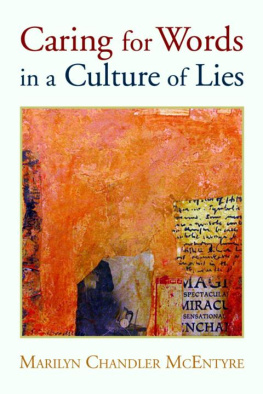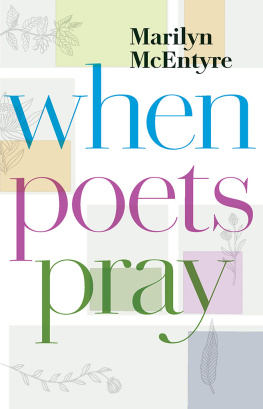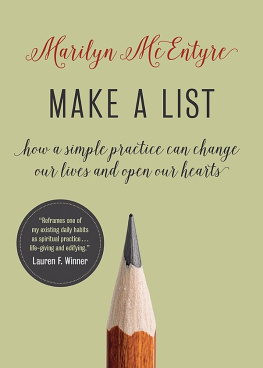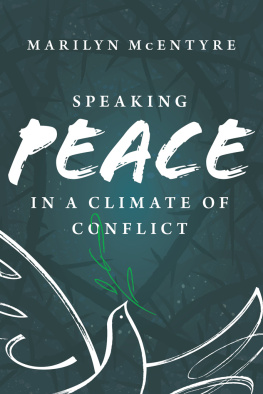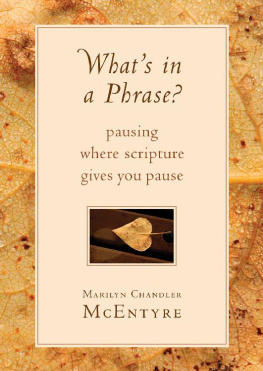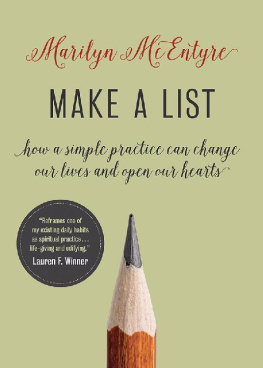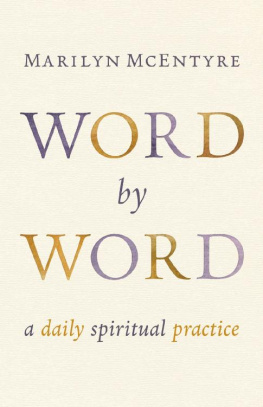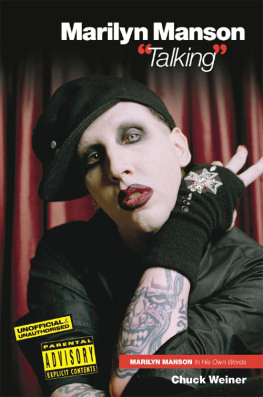Marilyn Chandler McEntyre - Caring for Words in a Culture of Lies
Here you can read online Marilyn Chandler McEntyre - Caring for Words in a Culture of Lies full text of the book (entire story) in english for free. Download pdf and epub, get meaning, cover and reviews about this ebook. year: 2010, genre: Home and family. Description of the work, (preface) as well as reviews are available. Best literature library LitArk.com created for fans of good reading and offers a wide selection of genres:
Romance novel
Science fiction
Adventure
Detective
Science
History
Home and family
Prose
Art
Politics
Computer
Non-fiction
Religion
Business
Children
Humor
Choose a favorite category and find really read worthwhile books. Enjoy immersion in the world of imagination, feel the emotions of the characters or learn something new for yourself, make an fascinating discovery.
- Book:Caring for Words in a Culture of Lies
- Author:
- Genre:
- Year:2010
- Rating:4 / 5
- Favourites:Add to favourites
- Your mark:
- 80
- 1
- 2
- 3
- 4
- 5
Caring for Words in a Culture of Lies: summary, description and annotation
We offer to read an annotation, description, summary or preface (depends on what the author of the book "Caring for Words in a Culture of Lies" wrote himself). If you haven't found the necessary information about the book — write in the comments, we will try to find it.
Caring for Words in a Culture of Lies — read online for free the complete book (whole text) full work
Below is the text of the book, divided by pages. System saving the place of the last page read, allows you to conveniently read the book "Caring for Words in a Culture of Lies" online for free, without having to search again every time where you left off. Put a bookmark, and you can go to the page where you finished reading at any time.
Font size:
Interval:
Bookmark:

MARILYN CHANDLER MCENTYRE
This book originated as the 2004 Stone Lectures at Princeton Theological Seminary
In loving memory of Mary and LeGare Chandler and Jack and Effie Chandler who taught me to speak and to listen and to appreciate the punch line
ix
xi
Love Words
Tell the Truth
Don't Tolerate Lies
Read Well
Stay in Conversation
Share Stories
Love the Long Sentence
Practice Poetry
Attend to Translation
Play
Pray
Cherish Silence
 am grateful to Princeton Theological Seminary for offering me the privilege of delivering the Stone Lectures in 2004 that became the core of this book, and to William B. Eerdmans and Mary Hietbrink for their help in bringing it to its present form.
am grateful to Princeton Theological Seminary for offering me the privilege of delivering the Stone Lectures in 2004 that became the core of this book, and to William B. Eerdmans and Mary Hietbrink for their help in bringing it to its present form.
I am particularly grateful to George and Deborah Hunsinger, both professors at Princeton Seminary, for their friendship and encouragement in this endeavor.
I am grateful to my colleagues in the English and Modern Language Departments at Westmont College for the depth and fidelity I have witnessed in their care for language and story. Over the past twelve years I have learned much from each of them.
I am grateful to more students than I can name here who, over thirty years of teaching, have asked questions and crafted sentences that taught me something new about how to use words and listen to them. You know who you are. Thank you.
I am grateful to the friends who have recited poems or read aloud or quoted lines they loved or poked holes in propaganda or sustained nourishing conversation into the wee hours.
I am grateful to my brother, David, who speaks truth, clearly, to power.
I am grateful to each of our six children and their sweet spouses and significant others for the ways their words warm my heart. I hope to stay in conversation with you as long as language is given to me.
I am grateful for the chance to watch five little boys make their way into speech and song. Stephen, Matthew, Thomas, Christopher, and Benjamin, may you learn many words and use them with wit and grace.
And I am deeply grateful, more than words can express, for John. The conversation we share sustains me in the darkest times, keeps me accountable, and makes every day a gift.
Gentle Readers,
 he sense of urgency that fueled these reflections on caring for words has grown over years of teaching literature, writing, listening to lectures, sermons, and State of the Union addresses, and seeking ways to impart to the young "the joy of a graceful sentence." Although the opening chapter is rather darkly diagnostic, I hope you will press on to the remaining chapters, which are meant to offer encouragement. There are gracious and inventive ways to enjoy words and to reclaim them as instruments of love, healing, and peace. All of us who speak, read, write, and listen to each other have opportunities to do that and to foster the kinds of community that come from shared stories and surprising sentences.
he sense of urgency that fueled these reflections on caring for words has grown over years of teaching literature, writing, listening to lectures, sermons, and State of the Union addresses, and seeking ways to impart to the young "the joy of a graceful sentence." Although the opening chapter is rather darkly diagnostic, I hope you will press on to the remaining chapters, which are meant to offer encouragement. There are gracious and inventive ways to enjoy words and to reclaim them as instruments of love, healing, and peace. All of us who speak, read, write, and listen to each other have opportunities to do that and to foster the kinds of community that come from shared stories and surprising sentences.
Because these chapters began as talks given as the Stone Lectures at Princeton Theological Seminary, many of my observations are directed specifically to people of faith who may share my concerns about how to read Scripture and how to take responsibility for the stories Christians hold in trust as heirs of that tradition. I hope, though, that any of you who care about language and story, whether because of your own faith traditions or because of your love for conversation, or for literature, or for children just learning to speak, will find here an invitation to reflect and to act in protection of the gift of language that binds us into human community.
If you've ever loved and learned a poem by heart, or underlined sentences just because they were beautiful, or labored over a speech about something that mattered, I know we share the concerns and the pleasures of stewards who recognize that we hold a great treasure in trust. It is my hope that a sentence here and there will start a conversation or encourage some of you to speak the truth that is in you, to find a sentence that suffices in a hard time, or simply to listen into the silences where the best words begin.
Marilyn Chandler McEntyre
 was talking recently about stewardship of resources with a young man who is hoping to make a career in environmental law. We considered the fate of water, soil, animal and plant species, and food systems. In the wake of that invigorating conversation, I found myself musing on the similar problems that beset another precious shared resource: words. Like any other life-sustaining resource, language can be depleted, polluted, contaminated, eroded, and filled with artificial stimulants. Like any other resource, it needs the protection of those who recognize its value and commit themselves to good stewardship.
was talking recently about stewardship of resources with a young man who is hoping to make a career in environmental law. We considered the fate of water, soil, animal and plant species, and food systems. In the wake of that invigorating conversation, I found myself musing on the similar problems that beset another precious shared resource: words. Like any other life-sustaining resource, language can be depleted, polluted, contaminated, eroded, and filled with artificial stimulants. Like any other resource, it needs the protection of those who recognize its value and commit themselves to good stewardship.
In these essays I'd like to reflect on what it might mean to be good stewards of language - what it might mean to retrieve words from the kinds of misuse, abuse, and distortion to which they've been subjected of late, and to reinvigorate them for use as bearers of truth and as instruments of love.
Caring for language is a moral issue. Caring for one The business of gently guiding rough strands pulled from the gathered wool into grooves where they may become fine thread suggests a rich idea of conversation as right, skillful, careful, economical use of what God and nature have provided for our use and protection.
To call upon another analogy, if language is to retain its power to nourish and sustain our common life, we have to care for it in something like the way good farmers care for the life of the soil, knowing nothing worth eating can be grown in soil that has been used up, overfertilized, or exposed to too many toxic chemicals. The comparison, I believe, is pertinent, timely, and precise - and urgent.
Not that the state of language is a matter for despair: there is much to celebrate in our verbal environment. Poets are featured weekly on public radio; dozens of versions of the English Bible are in print; Garrison Keillor is still telling stories and "pretty good jokes"; bilingual poets are stretching and enriching public discourse; Billy Collins and Toni Morrison are very likely at their keyboards even as we speak. Libraries offer programs for preschoolers, bookstores still stock Shakespeare, and every summer there's a theater festival somewhere nearby. PBS and Pacifica Radio still feature articulate analysts. The sheer availability of words - written, spoken, and sung - is historically unprecedented.
Font size:
Interval:
Bookmark:
Similar books «Caring for Words in a Culture of Lies»
Look at similar books to Caring for Words in a Culture of Lies. We have selected literature similar in name and meaning in the hope of providing readers with more options to find new, interesting, not yet read works.
Discussion, reviews of the book Caring for Words in a Culture of Lies and just readers' own opinions. Leave your comments, write what you think about the work, its meaning or the main characters. Specify what exactly you liked and what you didn't like, and why you think so.

